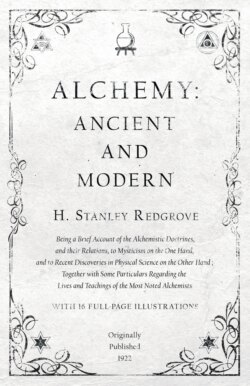Читать книгу Alchemy: Ancient and Modern - Being a Brief Account of the Alchemistic Doctrines, and their Relations, to Mysticism on the One Hand, and to Recent Discoveries in Physical Science on the Other Hand - H. Stanley Redgrove - Страница 17
На сайте Литреса книга снята с продажи.
The Basic Idea of Alchemy.
Оглавление§ 9. The famous axiom beloved by every alchemist—“What is above is as that which is below, and what is below is as that which is above”—although of quesable origin, tersely expresses the basic idea of Alchemy. The alchemists postulated and believed in a very real sense in the essential unity of the Cosmos. Hence, they held that there is a correspondence or analogy existing between things spiritual and things physical, the same laws operating in each realm. As writes Sendivogius “. . . the Sages have been taught of God that this natural world is only an image and material copy of a heavenly and spiritual pattern; that the very existence of this world is based upon the reality of its celestial archetype; and that God has created it in imitation of the spiritual and invisible universe, in order that men might be the better enabled to comprehend His heavenly teaching, and the wonders of His absolute and ineffable power and wisdom. Thus the Sage sees heaven reflected in Nature as in a mirror; and he pursues this Art, not for the sake of gold or silver, but for the love of the knowledge which it reveals; he jealously conceals it from the sinner and the scornful, lest the mysteries of heaven should be laid bare to the vulgar gaze.”9
The alchemists held that the metals are one in essence, and spring from the same seed in the womb of nature, but are not all equally matured and perfect, gold being the highest product of Nature’s powers. In gold, the alchemist saw a picture of the regenerate man, resplendent with spiritual beauty, overcoming all temptations and proof against evil; whilst he regarded lead—the basest of the metals—as typical of the sinful and unregenerate man, stamped with the hideousness of sin and easily overcome by temptation and evil; for whilst gold withstood the action of fire and all known corrosive liquids (save aqua regia alone), lead was most easily acted upon. We are told that the Philosopher’s Stone, which would bring about the desired grand transmutation, is of a species with gold itself and purer than the purest; understood in the mystical sense this means that the regeneration of man can be effected only by Goodness itself—in terms of Christian theology, by the Power of the Spirit of Christ. The Philosopher’s Stone was regarded as symbolical of Christ Jesus, and in this sense we can understand the otherwise incredible powers attributed to it.
